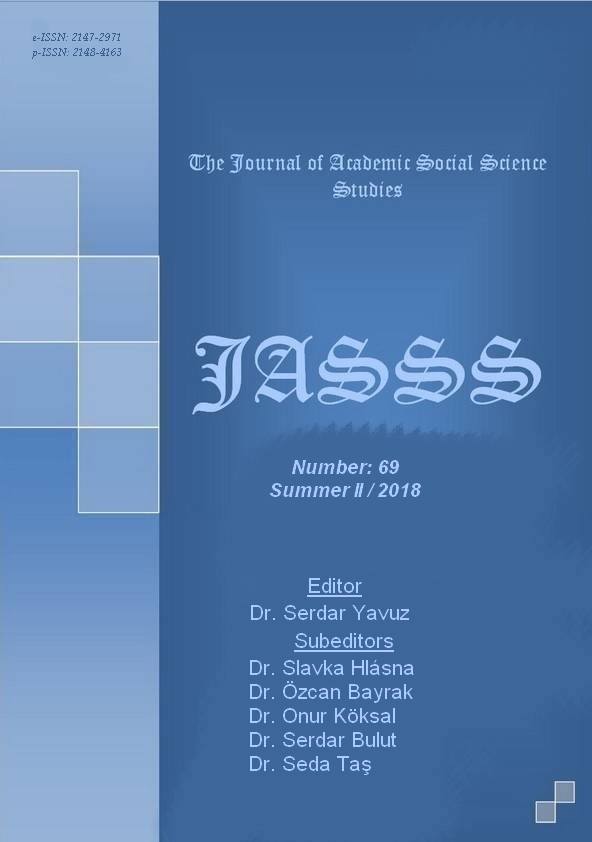SAMUEL BECKETT’ İN ‘GODOT’ U BEKLERKEN’ ADLI ESERİNDE İKINCİ DÜNYA SAVAŞI VE KAPİTALİZMİN MODERN BİREY ÜZERİNDEKİ ETKİLERİ
Author :
Abstract
Godot'u Beklerken, Samuel Beckett’ ın Godot adında birisinin gelmesi için iki karakterin beklediği tiyatro oyunudur. Bekledikleri karakter asla gelmez ve bu iki karakter beklerken çeşitli tartışmalara girerler. Sonrasında iki diğer karakterle daha karşılaşırlar. Bu oyunuyla, Samuel Beckett, İkinci Dünya Savaşı ve kapitalizminin yarattığı yeni dünya düzeninde, bireyin anlamsız ve psikolojik olarak travmatize olmuş durumunu betimlemiştir. Bu ünlü tiyatro oyununda, yeni ortaya çıkan ekonomik düzen ve insanların çarpık psikolojisi arasındaki etkileşime ortaya konmaktadır. Savaşın ve kapitalizmin neden olduğu travmanın bir sonucu olarak, karakterleri aracılığıyla Beckett, zaman algısını ve varoluşlarının anlamını yitirmiş birey tiplerini temsil etmektedir. Bu kapsamda, bu çalışma, kapitalist ekonomik yapı ile bireysel psikolojinin şekillenmesi arasındaki etkileşimi analiz etmektedir. Bu ikisi birbirini yaratarak, birey üzerinde halihazırda var olan hastalıkları bir kısır döngü içinde şiddetlendirir. Beckett, İkinci Dünya Savaşı'nın sosyo-ekonomik ve psikolojik etkilerini ve bireyleri anlamsız bir döngüye girmesini ve esrarengiz bir biçimde insanları ele geçiren yeni kapitalizmi sorgularken, savaş sonrası insanı ve onun ekonomik, sosyal ve psikolojik çöküşünü tasvir etmektedir. Godot'u beklerken, modern bireyin deformasyonu ve dönüşümü açığa çıkaran bir çalışmadır. Hegelci ve Marksist bakış açıları, tarihin daha iyiye doğru ilerlemesini öngörürken, kapitalizmin bireysel yaşamlar üzerindeki etkisini ortaya koyan Beckett, bu dünyada çok az ümit olduğunu ortaya koymaktadır. Suçu, İkinci Dünya Savaşı'nın etkileri ve yeni kapitalist düzenin ortaya çıkışı olarak öngörürken, Beckett' in betimlediği dünya, hem bugünü hem de geleceği kaybetmiştir.
Keywords
Abstract
Waiting for Godot is a play by Samuel Beckett, where two character wait for the arrival of someone called Godot. Godot never arrives and while waiting they engage in a variety of discussions and encounter two other characters. In this play, Samuel Beckett portrayed the meaningless and psychologically traumatized condition of the individual in the new world order created by the Second World War and capitalism. His influential play focuses on the interaction between newly emerged economic order and distorted psychology of people. As a consequence of the trauma caused by the war and capitalism, through his characters, Beckett represents the types of individuals who have lost their perception of time and the meaning of their existence. The present study analyzes interaction between the capitalist economic structure and the forming of the individual psychologies. The two create each other and exacerbate the already existing ill effects on the individual in a vicious circle. Beckett foresees the socio-economic and psychological impacts of the Second World War and the new capitalism that have made the individuals captured in a meaningless lacunae and as an absurdist playwright, Beckett depicts the post-war man and his economic, social, and psychological collapse. Through Waiting for Godot, the deformation and the transformation of the modern individual is exposed. Disagreeing with Hegelian and Marxist perspectives concerning the progression of history for better, but agreeing with the impact of capitalism on individual lives, Beckett’s world offers little hope. Putting the blame on the after-effects of the Second World War and the emergence of the new capitalist order, what Beckett depicts in the play is a world that has lost both the present and the future.
Keywords
- Beckett, S. (1952). Waiting for Godot. London: Faber and Faber Ltd.
- Berger, A. (1995). Cultural Criticism. Califor- nia: Sage Publications Inc.
- Balkaya, S. (2013). New World Order After World War II and Turkey. JASS Studies: The Journal of Academic Social Science Studies. 6(2), 149-164.
- Birkett, J. (1987). Waiting for Godot by Samuel Beckett. London: Macmillan Press Ltd.
- Bowles, P. (2007). Capitalism. Great Britain: Pearson Education Limited.
- Eagleton, T. (1976). Marxism and Literary Criti- cism. Great Britain: Routledge.
- Erdelyi, H. (1985). Psychoanalysis: Freud's Cog- nitive Psychology. W.H. Freeman and Company.
- Esslin, M. (1968). The Theatre of the Absurd. London: Cox&Wyman Ltd.
- Freedman, R. (1961). Marx on Economics. Great Britain: Penguin Books.
- Hall, S., and Lindzey, G. (1978). Theories of Personality. New York: John Wiley & Sons Inc.
- Hegel, G. W. (1956). The Philosophy of History. New York: Dover Publications Inc.
- Horney, K. (1992). Our Inner Conflicts. New York: Norton & Company.
- Jameson, F. (1991). Postmodernism, or, The Cul- tural Logic of Late Capitalism. New
- Kenner, H. (1961). Samuel Beckett A Critical Study. Great Britain: John Calder Publishers Limited.
- Buss, D. M. (2010). Personality Psychology. New York: The McGraw-Hill Companies.
- Lee, L. E. (1991). World War II. New York: M.E. Sharpe Inc.
- Nader, K., Dubrow, N., and Stamm, B. H. (1999). Honoring Differences: Cultural Issues in the Treatment of Trauma and Loss. Philadelphia: Bruner/Mazel Taylor & Francis Group.
- Nietzsche, F. (2005). Thus Spoke Zarathustra. New York: Oxford University Press.
- Parker, R. (1997). The Second World War A Short History. Oxford: Oxford University Press.
- Pilling, J. (Ed.). (1994). The Cambridge Compa- nion to Beckett. Cambridge University Press.
- Schlueter, J., and Brater. (1991). Approaches to Teaching Beckett’s Waiting for Godot. New York: Modern Language Asscociation of America.
- Sternlicht, S. (2005). Masterpieces of Modern British and Irish Drama. Westport: Greenwood Press.
- Siemens, H. W., and Roodt, V. (2008). Power and Politics. Berlin: Walter de Gruyter Gmbh & Co.
- Toker, Ö.(2017). The Form of Western European Anthropocentric Liberalist Entrepreneur Mentality and The Building of Civilization: JASS Studies: The Journal of Academic Social Science Studies. 54 (1), 407- 416.





